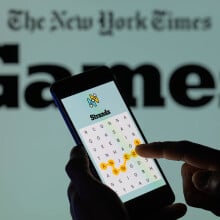You're heartbroken, and you're on Instagram. You type in your ex's name through tears in the search bar. It was a messy breakup; you squint so you can't see whether they archived photos of you two, and with shaky fingers, you tap their profile and unfollow them.
The next day, you see a tagged photo of them at the top of your feed. Their friend — who you still follow — posted it. Once again, you're in tears. You're spiraling. How did this happen?
Likely, "the" algorithm. Across the internet, users have complained about being confronted by profiles and memories they'd rather not see. If that's happened to you, you're not alone — researchers spoke to Mashable about why this happens, and what you (and the platforms) can do about it.
How do algorithms work?
Social media algorithms are complex, and the platforms don't reveal a lot about their inner workings. What we do know is that social media networks rely heavily on who you interact with; Instagram, for example, states that its "algorithm relies on 'signals' based on how you interact with the app, and how other people interact with you." The posts you see depend on who you engage with — your "network," naturally.
A lot of algorithms make assumptions based on who you're interacting with, often for months or years, data scientist Kristine Snyder told Mashable. If suddenly you don't want to act with one or more people you shared a lot of data with for years, the algorithm may not figure that out quickly.
Algorithms "just look at whether those connections were there before and assume that they're still there until there is sufficient data to say that they're not," Snyder said. "And it can take a significant amount of time for there to be sufficient data for the algorithm to understand that those connections are not there anymore."
Why social algorithms hurt post-breakup
Humans react to a breakup with empathy; not so with an algorithm. "Algorithms are not generally encoded to be empathic," Snyder said. If there's no feedback mechanism in a network — like blocking someone — the algorithm needs time to gather new data to determine you don't want to interact with this person anymore.
"Algorithms are not generally encoded to be empathic."
"You can't capture the totality of human life and human experience into bits and bytes just yet," said assistant teaching professor in the ATLAS Institute at the University of Colorado Boulder, Anthony Pinter.
Pinter studies life transitions and ways people manage their data after experiencing such transitions — such as breakups. (His recent work is about music and breakups, and he's currently running a survey about breakup songs you can participate in.)
In a 2019 paper "Am I Never Going to Be Free of All This Crap?", Pinter and his co-authors observed that people had unexpected, upsetting encounters with content related to ex-partners due to the Facebook algorithm. This happened in various places on Facebook — the social network in which the paper focused — like on their feed, in groups, or with the "On This Day" memory feature.
The paper also delved into another post-breakup problem: Mutual friends. Even if you unfollow or block your ex, you might still be connected with your ex's friends and family. These connections complicate what you should do with your online presence after a relationship ends. Some people Pinter and his co-authors spoke to for the paper stated it wasn't always appropriate or practical to disconnect from an ex's network.
Though the paper was published several years ago, "the ways in which these platforms are still leveraging loose ties and third-tier connections to make recommendations, is still potentially problematic," said Pinter, such as recommendations for who you should follow on Facebook or Instagram.
When you break up with someone, "you're breaking up with an entire network to some degree," Snyder said. An algorithm isn't necessarily going to recognize how a whole network of relationships shifts after a breakup.
"Those kinds of things where something was a connection, and then all of a sudden, those connections are broken in a way an algorithm has no way of understanding — that's where issues can come in," she said.
Ultimately, we're not in control of what we see on our social media feeds, so seeing something that upsets us might be inevitable. "When you're not the one making the decisions about what you see, it's really hard to avoid those things that are going to continue causing that hurt and pain in a way where you can heal from it — without just leaving social media altogether," Snyder continued.
What can social media platforms do?
"Humanizing algorithms" is difficult for platforms to do, for multiple reasons.
One reason is because there's a trade-off between stability and responsiveness when building algorithms, Snyder said. Social media algorithms aren't built to adapt to sudden changes like a breakup. "It's just really hard to have an algorithm that's built for one thing to work really well for something else, where things are changing suddenly," she said.
Another challenge is that different people react to breakups differently. In research published in 2022, Pinter and co-author Jed Brubaker identified two types of people post-breakup: past-focused "archivists" and future-focused "revisionists." The former usually don't delete data off their social media platforms because they believe doing so would be inauthentic to who they are now. The latter type of person does delete data because who they were in the past (or who they were with) isn't who they are moving forward.
"It turns out that to design features for these two very different kinds of people is probably difficult," said Pinter, "because to design a feature for one type of person almost inevitably creates a feature that is going to harm the other type of person." Designing an algorithm that encourages users to delete data may offend the person who believes doing so is inauthentic — but designing something that encourages retention may not work, either.
Pinter has some suggestions for what platforms can do, like giving users better tools to keep memories but keeping them in places that are only accessible to them. That does exist in some form — like Instagram's archive — but the problem with that archive, Pinter said, is that it's hidden and it's "just a bucket that you dump posts into." So he suggests an archive with organizational capacity so users can pick and choose what they see in their archive.
"There's a really ripe area here for designers and other researchers to think about in the sense of, 'What if it isn't just deletion, but what if our archival features are better?'" Pinter asked.
Platforms can also provide an easier way to unfollow someone without having to tap on their profile, like the option to do so in the search bar, he said.
A risk of better algorithmic features for breakups is forcing users to provide even more data to platforms than they already do, but there might be ways around that. Features like Facebook's Relationship Status can also be operationalized to tailor algorithmic suggestions or changes if you go from "In A Relationship" to not, Pinter suggested.
What can users do to 'fix' their algorithm?
This issue is difficult from both a designer's and a user's perspectives.
"It's a difficult space to navigate, either as somebody who's had some event in their life, or all of a sudden they are not seeing somebody anymore or for somebody trying to design an algorithm that can possibly deal with those things," Snyder said.
Pinter recommends users delete data if they don't want it to be fodder for recommendations — but even that is imperfect. In the 2019 paper, Pinter observed that "participants who had sworn that they deleted everything, and it turns out they hadn't, so they were still getting sort of upsetting or unexpected recommendations." Pinter also caveated that he himself is a future-facing person, but noted that other research shows that getting space after a breakup is important for healing.
Then again, you might not want to delete your ex from your life. "Network connections are not always that black and white," Snyder said. Sometimes, you might want to unfollow or block your ex, but not in every case.
"It can be really difficult when you undergo some sort of breakup, you don't want to cut out all the good things that you had from that, in addition to like, to having the breakup, you want to remember the good things," she continued.
That answer lies with you. Most likely, whether you unfriend or keep those loose ties, it will take time for the algorithm to catch up. Pinter also advised users to think carefully about what they post online moving forward.
You can also take a social media break for a while. While there are possible changes platforms can implement to make a break-up easier, they don't exist yet — and taking some space from the platforms themselves might be the best solution right now. When in tears, exit the Instagram app.
Topics Social Media















